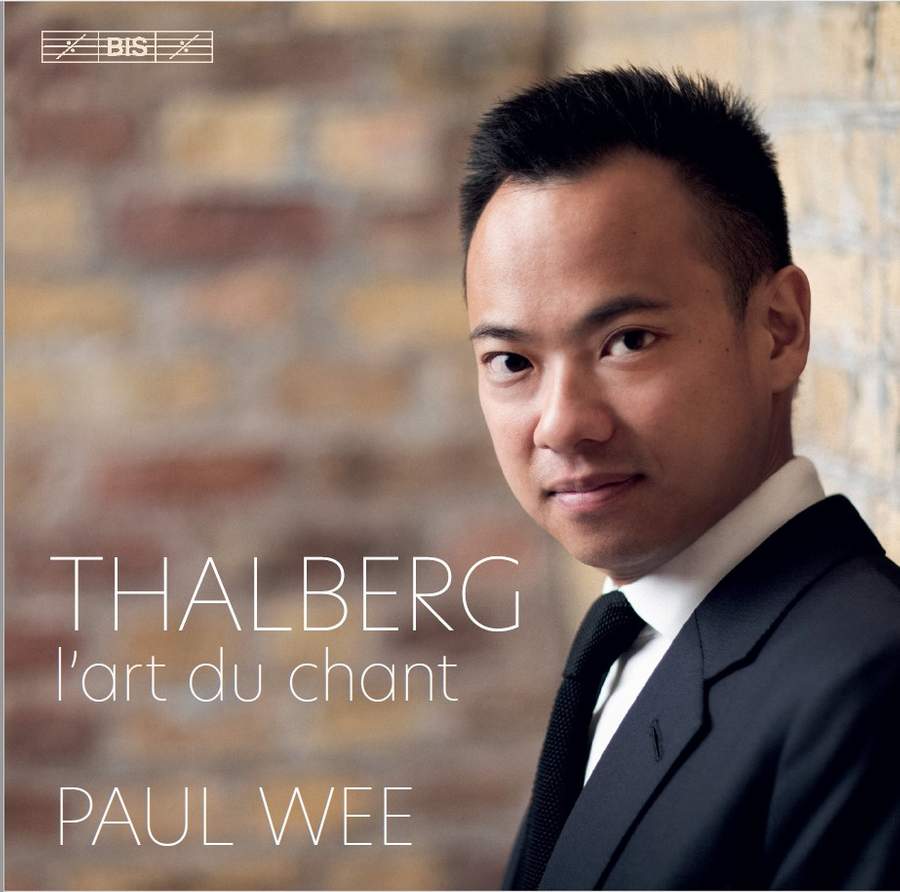THALBERG L'Art du Chant (Paul Wee)
View record and artist detailsRecord and Artist Details
Genre:
Instrumental
Label: BIS
Magazine Review Date: 12/2020
Media Format: Super Audio CD
Media Runtime: 138
Mastering:
DDD
Catalogue Number: BIS2515

Tracks:
| Composition | Artist Credit |
|---|---|
| L'Art du chant applique au piano |
Sigismond (Fortuné François) Thalberg, Composer
Paul Wee, Piano |
| 3 Schubert Lieder |
Sigismond (Fortuné François) Thalberg, Composer
Paul Wee, Piano |
| Auf Flügeln des Gesanges (after Mendelssohn) |
Sigismond (Fortuné François) Thalberg, Composer
Paul Wee, Piano |
| 10 Pieces, Movement: No 3. Mi manca la voce (from Rossini's 'Mose') |
Sigismond (Fortuné François) Thalberg, Composer
Paul Wee, Piano |
Author: Jeremy Nicholas
L’art du chant appliqué au piano consists of 26 numbers published in four volumes between 1853 and 1863, each containing either six or seven arrangements from the song, opera or choral repertoire. These arrangements are not of the same order as those with which Thalberg dazzled audiences and is most commonly associated – the Fantaisies on Rossini’s Moses and Donizetti’s Don Pasquale, for example. Here, he seeks to charm rather than astound. His very different and specific aim is to use the music of other composers as a means of developing the expressive powers of the piano, to turn it from a percussive instrument into one ‘through skill and artifice’, as Thalberg wrote in his introduction, ‘[to] produce the illusion of sustained and prolonged sounds, [and] also that of swelling sounds’ (his italics).
Paul Wee, whose thrilling debut recording of Alkan’s Concerto for solo piano created such a stir (11/19), is only the second pianist to record the complete Op 70, and this is the only version currently available. That in itself makes this a most welcome addition to the catalogue, though it is not something to listen to from beginning to end in a single sitting. First, Thalberg never intended it to be heard in that way; second, after a while, a certain sameness of texture, tempo and character is apparent – far better to sample a few at a time; and third, Wee, while ever the keyboard poet, does not invest every number with the same level of engagement or imagination: there are instances (notably in a couple of numbers in series 1 and 2) where he goes little further than reading from the piano rack.
The vast majority of performances, however, are revelatory, and must be the envy of many a full-time professional. In those numbers that have been recorded by others, Wee’s playing equals or surpasses them, the most popular being a case in point – the clever arrangement of the ‘Lacrimosa’ from Mozart’s Requiem. Often it is those numbers that are deceptively difficult that bring out the best in him: ‘Adelaïde’ (Beethoven), for instance, ‘Il mio tesoro’ (from Don Giovanni) and ‘Fröhliche Klänge, Tänze, Gesänge’ (from Euryanthe).
Disc 2 is completed with transcriptions of three Schubert lieder, Mendelssohn’s ‘Auf Flügeln des Gesanges’ and the ingenious version of the quartet ‘Mi manca la voce’ from Rossini’s Mosè in Egitto. Whatever one’s niggles over L’art du chant, the playing here is so magically good that I would buy this set just for these final five items. BIS packages the two discs in a box to accommodate the lengthy and superb booklet in three languages by the pianist. Wee has shown in this beautifully recorded release (producer Andrew Keener and engineer David Hinitt) that Thalberg is a far more important composer for the piano than current opinion would have it.
Discover the world's largest classical music catalogue with Presto Music.

Gramophone Digital Club
- Digital Edition
- Digital Archive
- Reviews Database
- Full website access
From £8.75 / month
Subscribe
Gramophone Full Club
- Print Edition
- Digital Edition
- Digital Archive
- Reviews Database
- Full website access
From £11.00 / month
Subscribe
If you are a library, university or other organisation that would be interested in an institutional subscription to Gramophone please click here for further information.




